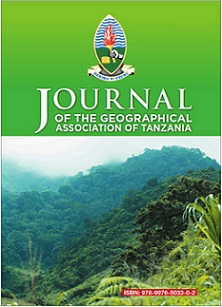The Implications of Non-timber Forest Products ' Access By-laws on Household Food Security in Semi-arid Zones of Iringa District, Tanzania
Abstract
Local communities in semi-arid zones of Iringa district are vulnerable to householdfood insecurity. Their vulnerability is mainly due to their dependence on climatesensitive
livelihood
sources,
especially
rain-fed
smallholder
crop
farming.
Consumption
and
sale
of
non-timber
forest
products
(NTFPs)
from
Kitapilimwa
Forest
Reserve
(KFR)
which
is under Joint Forest Management (JFM) offer an opportunity to the local
communities to improve their resilience to food insecurity. Though NTFPs are also
affected by climate change they are more resilient compared to agricultural crops and
livestock. Several management by-laws have been passed to protect KFR from
anthropogenic degradation and loss. However, the extent to which the KFR access bylaws
affect the availability of NTFPs for enhancing household food security had not
been examined.. Findings indicated that 76.2% of the respondents were food insecure.
Also, it was found that 40.9% and 20.1% of the food insecure households ate and sold
NTFPs to enhance household food security respectively. The few types of NTFPs they
were permitted to collect, low quantity of NTFPs to be collected, a few visiting days
and license fee were reported to be the main KFR management by-laws which
impacted on availability of NTFPs for enhancing household security. It is noteworthy
that forest conservation by-laws should not compromise local communities ' access to
NTFPs. Also, it is good to mainstream customary forest management laws in the
formulation of the conventional forest management by-laws.
Key words: Non-timber Forest Products, Semi-arid, Household Food Insecurity, By-laws
Downloads
Published
2016-02-12
Issue
Section
Articles


